It's claimed that this technology could completely transform how we store and utilise energy.
Singapore-based startup Flint claims it is the world's most sustainable battery, capable of addressing the significant environmental challenges of current energy storage systems through the use of renewable materials that can biodegrade within six weeks when buried in the ground.
which is also sufficiently lightweight, more affordable, and adaptable enough to power routine electronic devices.
The company describes it as a “ground-breaking water-based, rechargeable battery technology, developed from the ground up with sustainability at its core”.
It operates by incorporating a ring of hydrogel within a sheet of paper which serves as both a separator and an electrolyte, with its design targeted at integrating with current lithium-ion battery production methods.

The battery made its debut at the Consumer Electronics Show in Las Vegas this week, with the company looking to generate enthusiasm for this technology.
Flint has secured £1.6 million in funding to continue work on and launch the paper battery.
“With real-world applications just around the corner, we are completely committed to rolling out solutions to market,” said Flint CEO and co-founder Carlo Charles.
"engineered to excel where traditional technologies are not up to scratch, and we believe they will transform industries that require exceptional safety, environmental considerations and room for flexibility”.
The startup is currently in talks with more than 20 firms, according to Flint co-founder Jeremy Wee, with a number of commercial trials already in progress.
The companies, whose identities have not been disclosed, operate within a variety of sectors, including consumer electronics, electric vehicles, defence, and space exploration.
“These conversations show a rising desire for the latest energy solutions,” said Mr Charles. “We're not just providing a sustainable choice; we're providing a more superior, safer and cost-effective alternative to non-sustainable batteries.”
Mr Wee added: "A lower production cost is at the heart of driving demand, scaling up quickly, and boosting adoption rates while achieving profitability... Our commercial trials are already showing the real-world impact of our innovations."
.


Post a Comment
0Comments